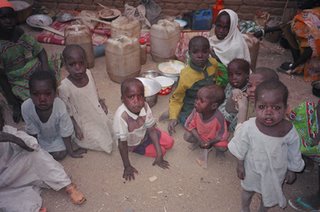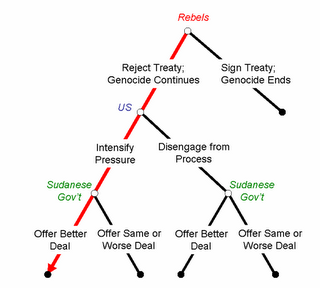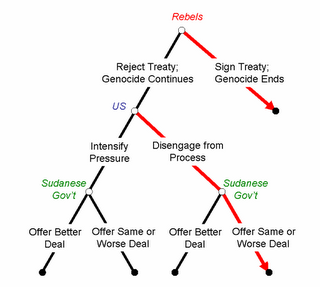The Economics of Genocide
by Chris Makler A recent op-ed by Alan J. Kuperman in the New York Times entitled "Strategic Victimhood in Sudan" advances a controversial theory: that rebel leaders in the Darfur region of Sudan share responsibility for the continued atrocities befalling their own people. Kuperman argues that the Save Darfur movement, made primarily of concerned Westerners, should stop interfering if it wants the genocide to end.
A recent op-ed by Alan J. Kuperman in the New York Times entitled "Strategic Victimhood in Sudan" advances a controversial theory: that rebel leaders in the Darfur region of Sudan share responsibility for the continued atrocities befalling their own people. Kuperman argues that the Save Darfur movement, made primarily of concerned Westerners, should stop interfering if it wants the genocide to end. Before we get to his argument, a bit of history. Loosely speaking, there are two sides in the decades-old civil war: one which supports the rebels and one which supports the government. Over the last few years, the Sudanese government has armed local militias called the janjaweed. The government-sponsored janjaweed militias terrorize the villages that support the rebels, raping and murdering civilian inhabitants. These atrocities have provoked outrage around the world.
Recently, international mediators proposed a peace deal. The Sudanese government agreed to it, but the rebels rejected the deal because it didn't give them full autonomy over their own lands. The mediators went back to the Sudanese government and extracted further concessions. One of the rebel groups agreed to the new terms, but now the various rebel factions are fighting among themselves.
According to Kuperman, "the rebels were willing to let genocide continue against their own people rather than compromise their demand for power." He argues that:
The rebels, much weaker than the government, would logically have sued for peace long ago. Because of the Save Darfur movement, however, the rebels believe that the longer they provoke genocidal retaliation, the more the West will pressure Sudan to hand them control of the region. Sadly, this message was reinforced when the rebels' initial rejection of peace last month was rewarded by American officials' extracting further concessions from Khartoum.
His argument amounts to an economic model: the rebels have an incentive to "provoke genocidal retaliation," and this incentive is reinforced by the well-meaning people in the Save Darfur movement. This model may be seen by the game tree in the following diagram:

Consequently, Kuperman argues, the optimal strategy for the United States to adopt is to disengage from the process. If we were to do this, the rebels wouldn't stand to gain by continuing to fight, because the Sudanese government wouldn't have an incentive to offer a better deal; therefore the rebels would have an incentive to sign the treaty, thereby ending the genocide:

But does Kuperman's argument make sense? Is the Save Darfur movement really unwittingly responsible for perpetuating the genocide? Some basic economic analysis can help us parse Kuperman's arguments and shed some light on what can best be done to help stop the violence in the region.
There are two ways to argue against the applicability of an economic model: you can say that its internal logic is inconsistent (i.e., its assumptions don't lead to its conclusions) or you can argue that its assumptions are not valid.
1.Try to think of the negotiations between the rebels and the government, both violent and nonviolent, as an economic game. According to Kuperman, what actions are available to the rebels and the government, and what are the payoffs for each set of actions? Do you think the game Kuperman proposes is an accurate reflection of the situation in Sudan? Or is his model misspecified in some way? If you think his setup is incorrect, how would you set the game up differently?
2. Suppose we grant Kuperman's assumption that the genocide bolsters Western support for the rebels and helps them extract further concessions from the Sudanese government. Why would the Sudanese government continue to commit atrocities in this case? If they wouldn't, does this mean that Kuperman's logic is internally inconsistent? If they would, then how can you explain this seeming contradiction?
3. Kuperman argues that "we should let Sudan's army handle any recalcitrant rebels, on condition that it eschew war crimes…[i]ndeed, to avoid further catastrophes like Darfur, the United States should announce a policy of never intervening to help provocative rebels, diplomatically or militarily, so long as opposing armies avoid excessive retaliation." Is this the only possible course of action consistent with his model? What other policy options are there?
4. Think about the last question from the opposite side now. First, what, in your estimation, is the best policy to pursue in Sudan? Now try to write down an economic model of the conflict in Darfur that would yield your policy recommendation as the best possible policy. What are the features of that model? In what way are they similar to Kuperman's, and in what way are they different?
Topics: Game Theory, International Relations



0 Comments:
Post a Comment
<< Home